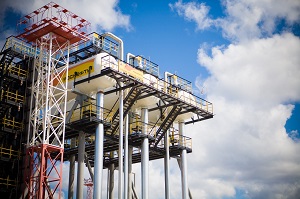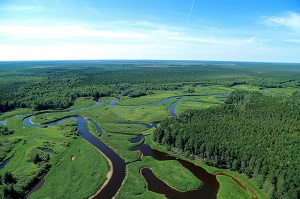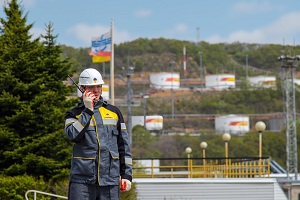Rosneft reduces fugitive methane emissions from its Upstream operations by 73% in 2019

Rosneft reduces fugitive methane emissions1 in its Upstream segment by 73% in 2019. This result has been achieved thanks to a comprehensive program of production improvements and methane reduction initiatives.
Key element of Rosneft’s Strategy sets an objective for it to become a leader in environmentally friendly business activities and join the first quartile of international oil and gas companies in terms of its per unit GHG emissions. Special attention is paid to reducing methane emissions – since the greenhouse effect of this gas is around 28 times higher than that of CO2.
In 2019, Rosneft joined the initiative of leading international oil and gas companies to reduce methane emissions by signing the Guiding principles to "Reducing methane emissions across the natural gas value chain".
 The Company will continue to implement cutting edge technologies for detecting and quantifying sources of methane emissions, including remote detection and leak prevention technologies.
The Company will continue to implement cutting edge technologies for detecting and quantifying sources of methane emissions, including remote detection and leak prevention technologies.
Rosneft also announced that the Company had committed to the UN Sustainable Development Goals (SDGs) with one of the five priority SDGs being SDG 13 on Climate action. Being one of the global majors in hydrocarbons’ production, Rosneft thinks strategically to help achieve the global objectives under the climate change combat.
Rosneft has plans to reduce it’s per unit GHG emissions by 5% whilst improving energy efficiency at its production facilities. These initiatives planned till 2022 will help prevent over 8 million tons of CO2 equivalent of GHG emissions.
Rosneft specifically focuses on development of the low-carbon segment of its business, increasing the production of natural gas and new types of products with improved environmental performance characteristics. The Company is also actively introducing its own innovations in APG utilization to not only ensure its reinjection to maintain the formation pressure, but also to benefit from its use as an electricity source. In 2019, the average APG utilization rate for brownfields reached 93.8% level.
In the end of last year and for the first time in Eastern Siberia, Verkhnechonskoye field used a new technology to pump APG into a temporary underground storage facility. The technology is unique because it allows for temporary gas storage so it can be subsequently utilized, instead of just using it to maintain the formation pressure.
This technology enabled Verkhnechonskoye oil and gas condensate field to achieve 97% APG utilization, which is one of the best results across the industry.
In 2019, the Company established the Carbon Management Subcommittee to coordinate corporate effort on the climate agenda. The Subcommittee includes top managers and heads of energy, economic and environmental functional units. The Company's Carbon management plan for 2020 includes actions on many important topics, such as:
- strategic development;
- reduction of industrial greenhouse gas emissions;
- development of carbon metrics and methodologies;
- development of industry partnerships;
- training;
- assessment of how physical climate risks impact operations.
The Company also regularly monitors implementation of its Gas Investment and Energy Saving Programs. Because of a 14% improvement in energy efficiency results, the Company has successfully reduced emissions worth 3.1 million tons of CO2 equivalent over the past two years.
 In 2018, Rosneft was the first in Russia to produce and market Euro 6 gasoline with improved environmental performance. The geography of sales has now expanded to nine regions of Rosneft retail operations. The Company also offers a wide range of low-sulfur marine fuels, which are in full compliance with the new requirements of the International Maritime Organization.
In 2018, Rosneft was the first in Russia to produce and market Euro 6 gasoline with improved environmental performance. The geography of sales has now expanded to nine regions of Rosneft retail operations. The Company also offers a wide range of low-sulfur marine fuels, which are in full compliance with the new requirements of the International Maritime Organization.
Alongside with that, Rosneft supports research activities including climate change studies. Since 2012, the Company has organized more than 20 large-scale Arctic expeditions. Hydrometeorological and climate-related information obtained during those expeditions is useful for safe marine navigation and design of future oil and gas facilities. Based on the research results, the Company has issued a unique publication – “Atlases of the Russian Arctic Seas”.
In terms of its onshore activities, Rosneft pays great attention to reforestation. In 2019, specialists from the Company's subsidiaries planted about 1 million trees, including about 5,000 trees as part of the All-Russian Ecological Cleanup Day “Green Spring-2019”.
Rosneft also partners with international companies in the area of emissions offsetting under various reforestation projects. For example, in 2018, in cooperation with DHL, Rosneft compensated for 13 tons of CO2 equivalent emissions from vehicles involved in its cargo transportations.
On a corporate scale, Rosneft's subsidiaries actively implement the Green Office principles, aimed at reducing resources’ consumption, heat and energy saving, improving the working conditions and the environment in general.
Rosneft, as one of the leaders among global oil and gas companies, participates in the international CDP (Carbon Disclosure Project) ranking, one the most respectable non-profit organizations that assesses companies against their environmental footprint, availability of appropriate strategies, corporate governance systems and risk management related to climate change, water and forest resources. Based on the independent assessment in the climate category, Rosneft was given “B” rating - the highest among Russian oil and gas companies. Thanks to Rosneft’s water management effort the Company was ranked “B-”in this category, which means that Company’s environmental policy is effective.
1 Organized and not organized emissions of CH4 and CO2 into the atmosphere resulting from technological operations from production, transportation, storage and processing of oil and natural gas.
Rosneft
Information
Division
May 21, 2020